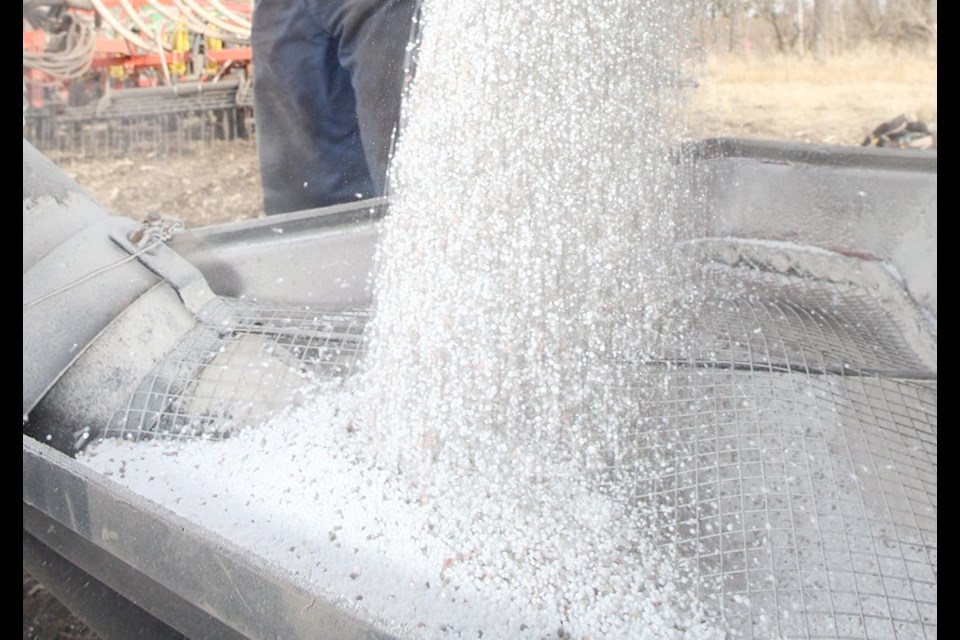WESTERN PRODUCER — The federal government’s “what we heard” report from fertilizer consultations suggests it needs to hear more.
A fertilizer working group will be formed under the advisory committee consulting on the Sustainable Agriculture Strategy. Its purpose is to strengthen communication, identify further supports, such as program funding and adoption of beneficial management practices, and improve measurement and tracking of fertilizer emissions.
Western Canadian Wheat Growers Association president Gunter Jochum said he isn’t surprised at the report.
“There’s a lot of pushback, still lots of questions and it’s good to see that the government realizes that there’s a tonne of questions,” he said.
The lack of accurate measurement about just how much greenhouse gas is emitted from synthetic fertilizers is mentioned throughout the report, which is based on more than 2,000 comments regarding the government’s proposed 30 percent reduction in emissions from fertilizer by 2030.
Jochum said he is concerned that more than half of the comments came from people who didn’t identify themselves as farmers and that organic producers, who don’t use synthetic fertilizers, have a say.
“I’m not dismissing that people in general have concerns with how their food is grown, however, does the public at large really know what’s happening on the farm, or what has happened on the farm in the last 20 or 30 years?” he said.
Jochum said he has used nitrogen inhibitors off and on for the last 15 years and just applied for the incentive offered through the Canola Council of Canada to try a newer product. But at a cost of $15 per acre, over 3,000 acres, for just an inhibitor alone, he said he’d like to know if it’s actually reducing emissions as much as claimed, given the variables in crops, soils, weather and fertilizer type itself.
Fertilizer Canada president Karen Proud said she was happy to see support for 4R nutrient management throughout the report.
“We’ve been calling on recognition of 4Rs from the federal government for years now,” she said. “Now we can see that the wide variety of stakeholders engaged all seem to support it.”
But she too said the industry has been pushing the government to develop better measurement and reporting methods.
“There is a data gap in actually understanding what our real emissions levels are and the problem lies with the methodologies,” Proud said.
International methods look at how much nitrogen is applied and estimates emissions but don’t take best practices into account, she said.
“Our current estimate of emissions is way off,” Proud said. “The government has recognized that all stakeholders no matter who you are, no matter who you represent, are saying we need to do better at measuring.”
She also said she’d like to see numbers set aside in favour of adopting best practices that will reduce emissions.
“Why not focus there instead of fighting over numbers?”
That said, making best practices such as 4R mandatory is not the way to go, she added, because of the same factors that cause problems in measurement.
“I think we need to leave it up to the farmers to work with their certified crop advisers on what are those best practices that work for the crop that they’re farming, the climate they’re in and let’s incentivize them through the use of carrots versus these sticks,” she said.
Jochum also said the working group should take a serious look at intensity-based measurement. Lowering emissions while increasing food output should be the goal, he said.
The report said “a high amount” of the submissions questioned whether a target was needed at all and whether the voluntary target would become mandatory.
It noted most recognized the need for climate action but that farmers should be recognized for what they’re already doing and that global food security should be top of mind.
“Input frequently cited the importance of considering the economics of reducing emissions, and the impact that climate change policies could have if done without considering producer profitability and yield,” the report said.
Regional considerations were also highlighted, with respondents saying local data and increased extension services would help them adopt BMPs.

